|
Printables |
PowerPoints |
Online exercises |
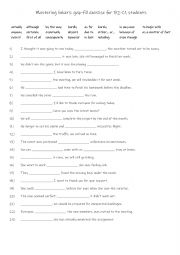
|
Mastering linkers gap-fill exercise for B2-C1 students 1
Linkers help to connect ideas smoothly within and between sentences, making writing and speaking more coherent and easier to follow. By using linkers effectively, students can clarify relationships between ideas, such as cause and effect (e.g., �due to,� �because of�) or contrast (e.g., �although,� �even though�), making their arguments and explana...
Level: advanced
Age: 12-100
Type:
Downloads: 112
|
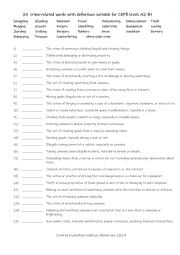
|
Match the crime words to their definitions
25 crime-related words with definitions suitable for CEFR levels A2-B1
Level: intermediate
Age: 12-100
Type: worksheet
Downloads: 109
|
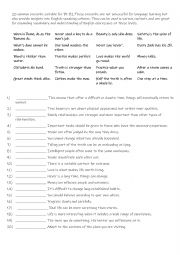
|
Match the proverbs to their meanings
20 common proverbs suitable for B1-B2.These proverbs are not only useful for language learning but also provide insights into English-speaking cultures. They can be used in various contexts and are great for expanding vocabulary and understanding of English expressions at these levels. Answers included on the following page.
Level: advanced
Age: 15-100
Type:
Downloads: 123
|
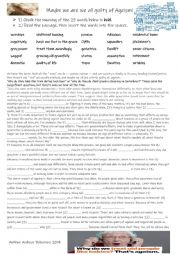
|
Maybe we are we all guilty of Ageism at one time or another!
700-Word reading passage with a 25-word gap fill exercise about how the majority of people still perceive the older generation and their ilks. This sheet is suitable for higher level B1 to C1 students of all ages. An answer sheet is included. For higher level students they could be put in groups to give / present their opinions in a presentation.
Level: intermediate
Age: 12-100
Type: worksheet
Downloads: 2137
|
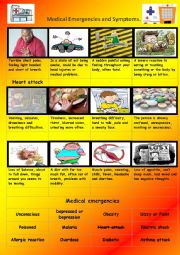
|
Medical Emergencies and Symptoms
Students read the symptoms, then match the correct medical term to each one.
Level: elementary
Age: 8-100
Type: worksheet
Downloads: 208
|
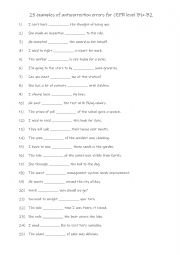
|
Mobile autocorrection errors
25 examples of autocorrection errors for CEFR level B1+-B2.Answers are provided on the following page.
Level: advanced
Age: 15-100
Type:
Downloads: 113
|
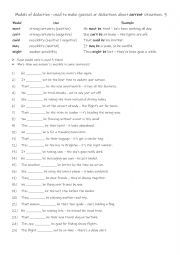
|
Modals of deduction - used to make guesses or deductions about current situations. 3
Students should learn modals of deduction because they are useful for expressing logical guesses or assumptions about present situations, helping speakers show how certain or uncertain they are. These modals, such as must, might, could, and can�t, make speech sound more natural and fluent, improve communication and reasoning skills, and are commonl...
Level: elementary
Age: 8-100
Type:
Downloads: 119
|
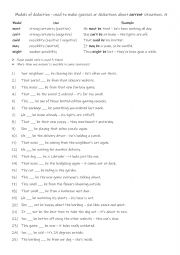
|
Modals of deduction - used to make guesses or deductions about current situations. 4
Students should learn modals of deduction because they are useful for expressing logical guesses or assumptions about present situations, helping speakers show how certain or uncertain they are. These modals, such as must, might, could, and can�t, make speech sound more natural and fluent, improve communication and reasoning skills, and are commonl...
Level: elementary
Age: 8-100
Type:
Downloads: 143
|
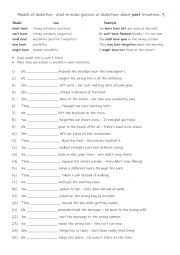
|
Modals of deduction - used to make guesses or deductions about past situations. 3
Students should learn modals of deduction because they are useful for expressing logical guesses or assumptions about past situations, helping speakers show how certain or uncertain they are. These modals, such as must have, might have, could have, and can�t have, make speech sound more natural and fluent, improve communication and reasoning skills...
Level: elementary
Age: 9-100
Type:
Downloads: 119
|
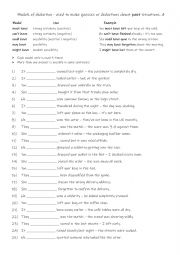
|
Modals of deduction - used to make guesses or deductions about past situations. 4
Students should learn modals of deduction because they are useful for expressing logical guesses or assumptions about past situations, helping speakers show how certain or uncertain they are. These modals, such as must have, might have, could have, and can�t have, make speech sound more natural and fluent, improve communication and reasoning skills...
Level: elementary
Age: 8-100
Type:
Downloads: 150
|
|
|
|
|












